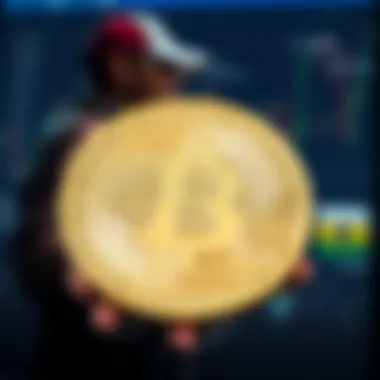Understanding Bolívares to USD Exchange Rates


Intro
The exchange rate between the Venezuelan bolívar and the United States dollar is more than just numbers on a financial screen. It reflects the turbulent history of Venezuela's economy, shaped by hyperinflation, political instability, and a global demand for oil. The bolívar, once a currency that could be relied upon, has seen its value plummet. This drastic transformation has profound implications for individual citizens, businesses, and investors alike.
As one delves deeper into the factors affecting this exchange rate, it becomes apparent that the bolívar's depreciation is not simply a result of local mismanagement but also influenced by wider global economic trends, investor sentiment, and technological innovations, particularly in the realm of cryptocurrency. These elements weave together a complex tapestry that investors and ordinary citizens must navigate with caution and insight.
In this article, we will dissect the various dimensions of the bolívar to USD exchange rate. From historical context to assessing market dynamics, we aim to provide a well-rounded perspective to our readers. By understanding these intricacies, stakeholders can equip themselves with valuable knowledge, which is essential for making informed decisions in a highly volatile economic landscape.
With all this in mind, let’s jump right into the latest trends shaping the landscape of currency exchange.
Latest Trends in Cryptocurrency
Cryptocurrency has become a key player in global finance, presenting new opportunities and challenges for traditional currency systems. As the bolívar's purchasing power has faded, more Venezuelans are turning to digital currencies as an alternative store of value and transaction medium.
Emerging Technologies and Innovations
The rise of blockchain technology has brought with it innovative solutions that can address some of the problems faced by the Venezuelan economy. Decentralized finance (DeFi) platforms allow users to lend, borrow, and trade without relying on traditional banking systems, which have largely failed many in Venezuela. Additionally, Bitcoin and other cryptocurrencies provide an escape from inflationary pressures. Here’s how:
- Larger Adoption: Many Venezuelans have turned to Bitcoin mining as an income source, leveraging the country's cheap electricity.
- Decentralized Exchanges: These platforms allow users to trade bolívares for cryptocurrencies without intermediaries, reducing reliance on unstable banks.
Market Dynamics and Economic Indicators
Understanding the shifts in the exchange rate is crucial for anyone involved in the market. Economic indicators such as inflation rates, oil prices, and government policies play a significant role in determining the strength of the bolívar against the dollar. Recent trends indicate a growing interest in stablecoins — cryptocurrencies pegged to stable assets — as potential hedges against the bolívar's volatility.
"Cryptocurrency might just be the lifebuoy that keeps the Venezuelan economy afloat amidst turbulent waters."
This rising interest underscores a broader shift within the community, suggesting that when traditional systems fail, people look for alternative solutions that promise more security.
In-Depth Analysis
To truly grasp the implications of the bolívar to USD exchange rate, one must analyze both macro and microeconomic factors that intersect.
Investment Strategies and Risk Management
Investors looking to engage with the bolívar must adopt comprehensive risk management strategies, taking into account the lurking volatility in the market. Here are some strategies:
- Diversification: Spread investments among different asset classes; don't put all your eggs in one basket.
- Focus on Bitcoin and Stablecoins: Given the bolívar's instability, cryptocurrencies might provide a relatively safer haven, provided you remain vigilant of their own market fluctuations.
Regulatory Developments and Their Impact
The tension between the Venezuelan government and cryptocurrency remains an ever-evolving landscape. New regulations can significantly impact the value of the bolívar and the feasibility of using digital currencies within the country. Keep an eye on:
- Changes in government policies regarding the acceptance of cryptocurrency.
- International sanctions that may affect trade and currency exchange.
By keeping a finger on the pulse of these developments, individuals and companies can make informed choices.
Historical Background of the Bolívar
Understanding the historical context of the Bolívar is essential when exploring its current value against the USD. The bolívar is not just a piece of paper or a number on a screen; it reflects the tumultuous economic history and the socio-political landscape of Venezuela. This background highlights how various factors have forged the path of this currency and shaped its fluctuations over time.
Origins of the Bolívar
The Bolívar was introduced in 1879, replacing the Venezuelan peso at a time when the country was trying to stabilize its economy after years of battles and political unrest. Named after Simón Bolívar, the liberator of several South American countries, this currency carried with it the weight of a revolutionary spirit. The Bolívar was intended to symbolize independence and self-governance, but the reality of Venezuela’s economic politics often told a different story.


This currency was not static; it evolved from its inception, trying to mirror the nation’s aspirations. Its design, initially simple, included symbols that linked to the nation’s rich history and cultural heritage. The effort behind crafting an identity around the Bolívar was more than just financial; it was a powerful statement about sovereignty. The challenge, however, has been whether this representation holds up against economic pressures from within and outside.
Economic History of Venezuela
When diving into the economic history of Venezuela, one will find a rollercoaster of oil booms and busts. Venezuela is blessed with one of the largest oil reserves in the world. For decades, the country thrived on oil exports, which accounted for a significant portion of its GDP. However, reliance on a single commodity created a dark cloud over economic stability, especially when oil prices plummeted.
The oil economy introduced profound disparities. During boom periods, wealth concentrated in the hands of a few, while many lived in poverty, a stark contrast to the aspirations tied to the Bolívar. Adding to this complexity were government policies, often misguided, that led to rampant inflation. The resource-rich land saw its currency lose value with every passing year.
The Bolívar's Evolution Over Time
The evolution of the Bolívar is a tale of unexpected twists and painful realities for many Venezuelans. Over the years, this currency experienced several redenominations. In 2008, the government knocked off three zeros, rebranding the old Bolívar to the bolívar fuerte, or strong bolívar. But attempts at rebranding seldom mended the deep-rooted economic woes.
As hyperinflation gripped the nation, the Bolívar transformed into a shadow of its intended purpose. It became increasingly difficult for ordinary citizens to afford basic goods. Many Venezuelans turned to alternative currencies, particularly the US dollar, as a refuge. These changes tell a story not just of a currency, but of a society grappling with hardship and adaptation to survive.
"In a land of enormous potential, the value of the Bolívar has become a reflection of political choices and societal resilience."
The impact of this evolution is not merely numerical; it infuses daily life and influences social dynamics. People now face the challenge of navigating a dual-currency system, where the contrast between the bolívar and the US dollar highlights deepening economic divides. The Bolívar's journey continues as it tries to find its footing amid a backdrop of instability and change.
Current Economic Climate in Venezuela
The economic climate in Venezuela today is a complex tapestry woven with high-stakes challenges and intricate layers of historical missteps. Understanding this landscape is crucial for stakeholders, from investors to tech enthusiasts. The way the bolívar interacts with the US dollar is reflective of a broader picture that highlights systemic issues, policy failures, and socio-economic dynamics at play.
Hyperinflation and Its Impact
Hyperinflation stands as one of the most pressing issues facing the Venezuelan economy. Since 2017, the inflation rate has skyrocketed, rendering the bolívar nearly worthless in real terms. Estimates suggest that at one point, the inflation rate exceeded a staggering one million percent, leading to everyday goods becoming prohibitively expensive.
- Diminished Purchase Power: The effect on citizens is dramatic; what used to be a modest loaf of bread has transformed into a month’s salary for many.
- Savings Devalued: Savings, once a guarantee of security, become a mirage, evaporating daily as prices soar.
- Social Unrest: This devaluation triggers social unrest; protests erupt when basic needs cannot be met.
The brunt of hyperinflation is not felt evenly across the population. The larger effects tailgate onto the working-class families who are struggling to make ends meet, deepening inequality and leading to a reliance on foreign remittances in US dollars for basic survival.
Government Policies Affecting Currency
Government policies play a pivotal role in shaping the exchange rate environment. The Venezuelan government has implemented various currency controls over the years, yet they often backfire. Initially aimed at stabilizing the economy, these policies have instead led to black markets where currency is traded at significantly different rates from official rates.
- Control Mechanisms: Policies intended to regulate the bolívar’s value occasionally incite desperation. For example, the Central Bank of Venezuela's efforts to maintain an artificial exchange rate can create chaos,
- Diminished Confidence: Such interventions diminish public confidence in the currency, pushing individuals toward the black market or even alternative currencies like Bitcoin.
- Cripto-Economy Rise: In fact, the advent of cryptocurrency reflects a desire for financial resilience amid chaotic fluctuations. This landscape suggests a need for a reevaluation of how currency policies can be structured to offer genuine stability.
Social Consequences of Currency Instability
The instability of the bolívar ripples into the social fabric of Venezuela. Economic crises often lead to profound societal shifts that can shape future generations. Families are more likely to prioritize immediate economic survival over long-term educational aspirations, driving a wedge into the future workforce.
- Emigration Trends: Venezuela has witnessed an exodus of talent. Skilled professionals are seeking opportunities abroad, leaving a vacuum in various sectors back home.
- Health Crises: Economic troubles also lead to a deteriorating health care system where basic medications become a luxury. Families must make tough choices between transportation to a hospital or buying food.
- Sense of Hopelessness: This pervasive sense of hopelessness can lead to mental health crises, further overlaying already dire circumstances.
"In the midst of chaos, opportunities for growth may arise; however, the luxury of patience is not afforded to those struggling beneath the weight of hyperinflation."
In summary, the current economic climate in Venezuela provides a multifaceted backdrop for understanding the currency exchange rates. The intertwined nature of hyperinflation, government policies, and social outcomes highlights the dire need for change. As readers continue through this exploration, they’ll find that the implications of these dynamics are both immediate and far-reaching for anyone involved in Venezuela's economy.
Understanding the Exchange Rate
The importance of this section lies chiefly in its breakdown of the mechanisms behind exchange rates, an area of necessity for anyone engaged in trading, investing, or even day-to-day transactions in Venezuela. Readers can gain insight into how the official and black market rates differ, what factors cause fluctuations, and why the US dollar holds a particular significance in the current landscape.
This understanding forms the bedrock for making astute financial choices in a climate where volatility is the norm rather than the exception. Moreover, it primes readers to look ahead, preparing them for potential risks and opportunities as the economy evolves.
Official vs. Black Market Rates
Exchange rates can be split into two distinct categories: the official rate set by the government and the black market rate that operates outside regulatory oversight. Understanding these differences is akin to knowing the ropes in a twisted game of chess.


The official exchange rate is generally published by the Central Bank of Venezuela. However, in a nation struggling with hyperinflation, many find this rate unfavorable for real-world transactions. Take for instance, a cup of coffee that costs, say, 1,000 bolívares at an official rate of 4.5 bolívares to a dollar. In the black market, you might find that same cup costing the equivalent of 1 dollar, showing an exchange rate of 1,000 bolívares to 1 USD.
On the other hand, the black market exchange rate emerges as a more reliable barometer of the bolívar's value in everyday exchanges. This clandestine market allows for greater fluidity but is fraught with its own set of risks, including scams and instability. The disparity between these two rates is often staggering, showing a significant economic divide within the country.
"The black market often reveals the true value of currency, making it a barometer for the economic pulse of consumers and businesses alike."
Factors Influencing Exchange Rates
A multitude of factors come into play when evaluating the exchange rates between bolívares and USD. Among the most significant elements is inflation, which has reached unfathomable levels in Venezuela. As prices skyrocket, the bolívar's purchasing power tumbles, leading to stark adjustments in the exchange rate.
Political stability also weighs heavily on the overall economic landscape. With ongoing political turmoil, confidence in the bolívar wanes, thus influencing how both locals and international players perceive its value.
Other elements at play include:
- Trade Deficits: A negative balance of trade can diminish demand for the bolívar.
- International Sanctions: These can restrict access to foreign exchange, exacerbating already volatile conditions.
- Speculation: Traders constantly seeking profit can impact exchange rates dramatically.
Understanding these dynamics helps individuals gauge when might be the right time to exchange currency, invest, or even hold onto bolívares, depending on their financial strategy.
Role of the US Dollar in Venezuela
The US dollar's presence in Venezuela extends beyond mere monetary exchange; it's become an indispensable lifeline. As inflation has decimated the value of the bolívar, the dollar has assumed a role as a standard of value. Many transactions, from buying groceries to paying for services, now routinely occur in USD.
This dollarization also signifies a shift in how the people view currency. Money is no longer just a means to an end but rather a tool for survival. An interesting point to consider is that several businesses openly accept dollars, offering subtle hints of economic adaptation despite the government's attempts to curtail such practices.
Moreover, the dollar serves not only as a safe harbor for Venezuelans but also as a consideration for international investors. It is crucial for anyone looking to invest in Venezuelan projects or companies to note that their assets may be evaluated in USD rather than bolívares.
Practical Conversion Methods
Understanding practical conversion methods is essential for anyone dealing with the Venezuelan bolívar and the US dollar. These methods provide a straightforward way to navigate the complexities of currency exchange in a fluctuating economic environment. By knowing how to convert bolívares to USD effectively, investors, traders, and tech enthusiasts can make informed decisions. There are several practical approaches to converting currencies, each with its pros and cons. Knowing these can help you avoid pitfalls in a currency landscape that feels like walking a tightrope.
Using Online Currency Converters
Online currency converters are a modern-day solution for many looking to exchange bolívares for USD. With just a few clicks, you can see the current exchange rate and convert a specified amount. For instance, websites like ExchangeRate.com or XE.com provide reliable and up-to-date exchange rates. It's as simple as entering the amount you have and hitting "convert."
However, while these tools are helpful, keep in mind that the rates displayed might not reflect the actual rate you'd receive through banks or when performing transactions. Always check the fine print and understand that rates can vary by the minute.
"A little research can save you a lot of moolah when converting currencies!"
Bank Exchange Services
Another common method is using bank exchange services. Many banks in Venezuela offer currency exchange, allowing customers to convert their bolívares to USD directly. The advantage here is the perceived security; banks are generally reliable and regulated. However, this method is seldom without its drawbacks. The exchange rates at banks can be less favorable than what you might find online. Additionally, there may be various fees or minimum transaction amounts, so it’s wise to ask about these in advance.
In some cases, banks may even require you to fill out forms and provide identification, which can complicate the process. If you are planning to exchange large sums, understanding these details beforehand can save you time and headaches.
Peer-to-Peer Trading Platforms
Peer-to-peer trading platforms serve as an alternative for currency conversion. They connect individuals looking to buy and sell currencies directly with one another. Platforms like LocalBitcoins or LocalSwap allow for trades between bolívares and other currencies, including USD. This approach often provides more competitive rates as users can negotiate directly.
However, a word to the wise—be cautious. Ensure the platform has a solid reputation and take time to verify the person you are trading with. There's a certain level of risk involved here, and it’s essential to proceed with caution, understanding that not every deal is a good deal.
Overall, when converting bolívares to USD, consider your options carefully. Whether you prefer online converters, banks, or P2P platforms, each method comes with its unique set of benefits and considerations. Stay informed and choose what fits best for your financial needs and circumstances.
Investment Implications
The exchange rate between the bolívar and the US dollar offers a complex web of investment implications. Understanding these implications is critical for anyone engaged with Venezuelan markets or looking to invest in this economic context. Not only do these fluctuations affect the nominal value of investments, but they also have a broader influence on purchasing power, inflation, and long-term financial strategy.


Investors often find themselves navigating a sea of volatility in the Venezuelan economy. This uncertainty fosters significant risks but also presents unique opportunities for savvy investors. Let's explore some key aspects worth considering in this unstable landscape.
Cryptocurrency as an Alternative
With the bolívar's sharp depreciation, many are turning to cryptocurrencies as a viable alternative for holding value. Cryptocurrencies like Bitcoin and Ethereum provide a hedge against local currency volatility. Given the increasing digitization of financial assets, these digital currencies can retain worth in ways that traditional currencies may not.
In Venezuela, where many face challenges in accessing foreign currency, cryptocurrencies become lifelines. They allow for cross-border transactions without heavy transaction fees or prohibitions on currency exchange. Furthermore, platforms like P2P exchanges enable users to trade bolívares for cryptocurrencies directly with minimal hassle.
However, potential investors should bear in mind the following when considering cryptocurrencies:
- Volatility: While cryptocurrencies can circumvent some issues, they can also exhibit extreme price swings.
- Regulatory Environment: Venezuelan authorities have expressed mixed feelings about cryptocurrencies, and this can create a legal grey area.
- Technical Understanding: Operating within the cryptocurrency ecosystem requires a fundamental understanding of digital wallets, keys, and market dynamics.
Risks of Currency Fluctuations
Investing in a context influenced by soft or pegged currencies, such as the bolívar, inherently carries risks. Here are some critical risk factors to keep in mind:
- Inflation Risk: High inflation can erode returns. If your investments are in bolívares, you may see your purchasing power diminish rapidly.
- Political Instability: Venezuela's political landscape remains tumultuous. Local policies can change overnight, affecting investment portfolios significantly. A sudden policy shift might lead to capital controls, preventing the free movement of funds.
- Market Access: Access to U.S. dollars may become restricted or heavily regulated. Investors must consider how this impacts their ability to liquidate investments or convert bolívares.
Ultimately, understanding these risks can help investors craft sound financial strategies tailored to the realities of the Venezuelan economy.
Diversification Strategies
Given the challenges of investing in bolívar-denominated assets, diversification emerges as a crucial strategy. By spreading investments across different asset classes, you can mitigate some of the volatility. Here are approaches to consider:
- Invest in International Assets: Allocating a portion of your investments to foreign stocks or ETFs may provide insulation against local currency depreciation. Consider funds that expose you to stable economies.
- Hard Assets: Real estate, gold, and other commodities can offer protection. They often maintain value, especially during inflationary periods.
- Bond Diversification: If inclined towards bonds, look beyond Venezuelan government bonds. Consider bonds from stable countries or those tied to commodities.
Investing in a volatile climate purposed with risks is not for the faint-hearted. A well-informed approach will go a long way in safeguarding investments.
Navigating the exchange rate of bolívares to USD and understanding its investment implications requires a combination of strategic insight, risk management, and market awareness. By recognizing the ever-changing dynamics, investors can position themselves better to thrive amidst challenges.
Future Outlook
The future outlook for the bolívar in relation to the USD is a topic of vital significance, especially for investors and businesses navigating Venezuela's economic waters. Currency values are not just numbers; they embody trust, stability, and policy direction. Understanding the trends and potential trajectories can equip stakeholders with the insight needed to make informed decisions.
Potential Currency Reforms
When pondering the future of the bolívar, one cannot neglect the possibility of currency reforms. These reforms might include adjustments to the official exchange rate, which, if managed transparently, could stabilize the currency over time. Historically, countries that undertake currency reform often do so to control inflation and restore confidence in their financial systems. In the case of Venezuela, any shifts could be triggered by:
- Changes in government policy
- International pressure from financial institutions
- The need for a reset in economic strategy to curb hyperinflation
Reforms might also take shape in how the government interacts with domestic and foreign markets, potentially paving the way for foreign investment. The concerted effort to regain control over the bolívar could lead to a more predictable economic environment.
Impact of Global Economic Trends
Economic trends outside Venezuela hold significant sway over the bolívar's future. Global market conditions, shifts in oil prices, and fluctuating interest rates play critical roles. The interconnectedness of economies means that a downturn in major economies can ripple through to Venezuela. Thus, stakeholders must keep a pulse on:
- Oil Market Volatility: As oil remains a cornerstone of the Venezuelan economy, global demand and pricing will impact the exchange rate directly.
- Trade Relationships: As countries redefine trade agreements post-COVID-19, Venezuela’s ability to engage will matter.
- Geopolitical Tensions: Sanctions and international relations bring uncertainty. Any easing of sanctions could boost investor confidence, leading to potential bolívar appreciation.
Staying attuned to these global changes allows Venezuelan stakeholders to anticipate possible impacts on the bolívar.
Adapting to Economic Changes
In such a volatile environment, adaptability is paramount. Individuals and businesses will need to recalibrate their strategies continuously. Embracing flexibility might involve:
- Using Digital Currencies: With the rise of digital currencies globally, Venezuelan traders can explore cryptocurrencies as an alternative to the bolívar or USD. This might serve as a hedge against inflationary pressures.
- Diversification in Investments: Investors should diversify their portfolios, considering assets outside of Venezuela to mitigate risks.
- Cultural Trends: Understanding local purchasing power and adapting to shifts in consumer behavior can guide businesses on pricing and product offerings.
The future of the bolívar and its relationship with the USD hinges not only on domestic initiatives but also on global influences; those who stay informed can position themselves better in a turbulent landscape.
As developments unfold, the narrative around the bolívar will evolve. Investors, traders, and tech enthusiasts alike must remain vigilant, exploring every avenue of economic data while remaining adaptive to ensure their strategies yield the best outcomes.
For further insights, checking resources such as Wikipedia, Britannica, or interactive communities on Reddit can provide valuable perspectives on the ever-shifting realities of currency exchange.















